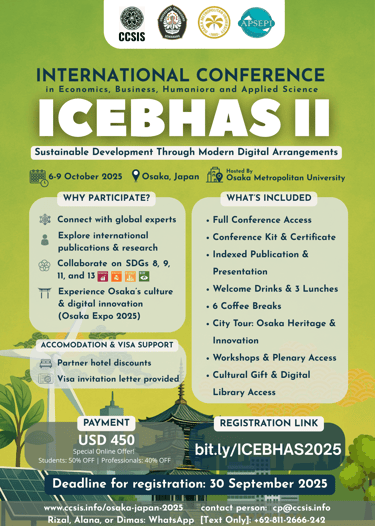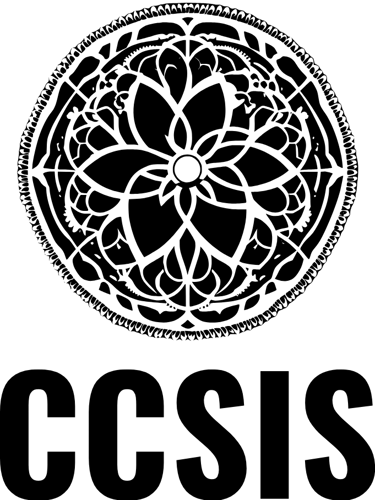

The research paper is focused on:
Education
Social Science & Humaniora
Communication
Energy Economics
Regional Economics
Public Economics
Industrial Economics
Monetary Economics
Natural Resources and Environmental Economics
Management Science
Finance
International Business
Applied Science
Islamic Economics
Applied International - national managerial Theory/Spectrum
Applied Decision-making Theory
Sample Topic covered :
Humaniora and Current Issues in Social Science [Communication Technology]
COVID-19 Pandemic Recovery: While vaccination efforts have been underway, the pandemic's economic effects persist. Issues include supply chain disruptions, labour shortages, shifting consumer behaviour, and monetary stimulus measures.
Energy Economics: Energy policy can cover many topics, including energy efficiency, renewable energy, fossil fuel development, electricity market, (type of market) transportation systems, and international energy trade.
Inflation: Many countries have experienced higher inflation rates due to supply chain disruptions, increased demand post-lockdowns, and monetary policies aimed at stimulating economies. Central banks are closely monitoring this situation and considering appropriate policy responses.
Climate Change and Sustainability: Climate change poses risks to businesses and economies, leading to discussions on sustainable practices, carbon pricing, renewable energy investments, and adaptation strategies.
Digital Transformation: The acceleration of digitalisation due to the pandemic continues, impacting various industries. Businesses are adapting to remote work, e-commerce growth, digital payments, and cybersecurity challenges.
Global Trade and Geopolitical Tensions: Trade tensions between major economies, such as the U.S. and China, and geopolitical conflicts affect international supply chains, trade policies, and investment decisions.
Health: Sustainable development requires maintaining or improving the natural environment, directly affecting public health. For example, air and water quality significantly impact respiratory and waterborne diseases. Efforts to manage natural resources responsibly, such as reducing emissions or conserving water bodies, are directly linked to health outcomes.
Poverty: Economic growth is often seen as a pathway out of poverty. However, for growth to be sustainable, it must not come at the expense of environmental degradation or social inequality. This requires policies that ensure wealth is distributed fairly and that economic opportunities are accessible to all, including marginalized and vulnerable populations.
Human Capital: Education is a cornerstone of human capital development, providing individuals with the skills and knowledge necessary to participate effectively in the economy and society. Sustainable development requires an educational framework that focuses on current job markets and anticipates future needs, including those related to green technologies and sustainable practices.
Food Security; the role of Asia Pacific, Western, and African sources?: Food security is a critical aspect of sustainable development, reflecting the complexity of integrating agricultural productivity, environmental sustainability, and socio-economic factors. The roles of different regions, such as the Asia Pacific, Western countries, and Africa, in achieving global food security each present unique challenges and solutions.
How to design project procurement with Clean Technology: Integrating clean technology into project procurement processes is essential for achieving sustainable development goals. Clean technologies use resources efficiently and responsibly, minimize emissions, reduce energy consumption, and decrease waste.
Infrastructure: Sustainable development in the context of infrastructure involves planning, designing, building, and maintaining infrastructure systems that meet present needs without compromising the ability of future generations to meet their own needs. This complexity stems from the need to integrate economic efficiency, environmental sustainability, and social equity into infrastructure projects.
Income Inequality: The pandemic has exacerbated existing inequalities, leading to discussions on fair wages, wealth distribution, social safety nets, and policies to address disparities.
Technological Disruption: Emerging technologies like artificial intelligence, automation, blockchain, and 5G are transforming industries, raising questions about job displacement, regulation, and ethical considerations.
Remote Work and Hybrid Work Models: The pandemic normalised remote work, prompting businesses to reassess traditional office setups and adopt hybrid models. This shift has implications for productivity, employee well-being, and organisational culture.
Fluid Worker and Fluid Job Paradigm Based on Technological Change
Financial Market Volatility: Market volatility persists due to uncertainties surrounding the pandemic, inflation, monetary policy decisions, and geopolitical developments. Investors are closely monitoring these factors and adjusting their portfolios accordingly.
Supply Chain Resilience: The pandemic exposed vulnerabilities in global supply chains, leading to discussions on reshoring, diversification, just-in-case inventory strategies, and technology-enabled supply chain management.
Current issues in Islamic Economics include Islamic Public Economy, Halal Economics and Industry, and Sharia Finance and Banking.


Get in touch
Socials
Subscribe to our newsletter
Copyright ©2024-2025 by Society of Complex Systems and Interdisciplinary Studies ║ International virtual Office: érables 94470, Boissy St Leger, France. Bank Address: Avenue Louise 54, Brussels, 1050, Belgium.
